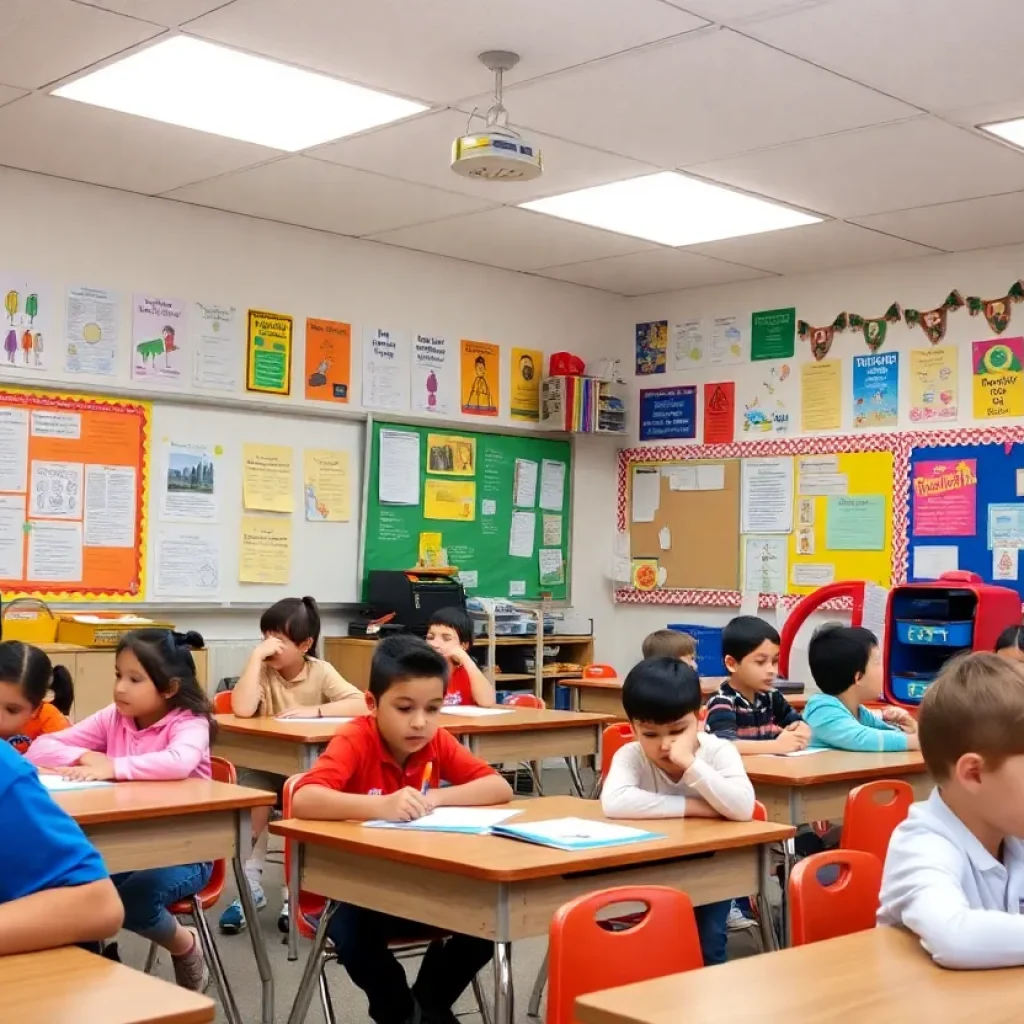

Students in a classroom reflecting the changes in Tennessee's educational policies.
The recent Tennessee legislative session produced significant education bills, including school voucher proposals, arming teachers, and safety regulations. The session highlighted ongoing debates about educational funding and mental health support, and introduced measures for employee leave policies in public charter schools. While some bills faced opposition, they reflect the evolving educational landscape and the community’s active engagement in shaping future policies for Tennessee schools.
Greetings, Tennessee! As we gear up for the next legislative session, it’s time to recap the hot-button education bills that recently flew through the Tennessee General Assembly. This session has unveiled some major proposals that could reshape the future of education in our state.
One of the most talked-about bills is the massive school voucher program proposed by Governor Bill Lee. This initiative is designed to provide taxpayer-funded vouchers for students wishing to attend private schools—regardless of their family income. Despite its appeal to some families, the bill has faced significant pushback and ultimately did not pass this year due to disagreements among lawmakers. Protests erupted as many citizens expressed their concerns about the implications of such programs for public school funding.
Another contentious policy revolves around the idea of arming teachers. A bill has successfully passed, allowing designated K-12 teachers and staff to carry concealed weapons in schools. However, districts have the discretion to opt out of this policy. This move adds another layer of debate about safety and security in our schools, sparking discussions on the best ways to protect our students.
Changes to educational policies are also reflected in the new law affecting fourth graders. With the passage of SB2183/HB2326, decisions regarding whether to hold back students will now be in the hands of schools and parents. This legislation impacts a large number of students due to the highly debated mandates concerning reading proficiency.
Tennessee schools are set to enhance safety protocols with the unanimous passing of SB1979/HB1644, which requires all schools to establish clear procedures for responding to fire alarms, including those for active shooter situations. These measures aim to ensure the safety of everyone on school grounds and must be implemented by January 1, 2025.
In an effort to integrate safety training within the curriculum, age-appropriate firearm safety instruction will be a requirement for students starting in the 2025-26 school year. Additionally, private schools now have the option to adopt their own handgun carry policies. These developments reflect an ongoing commitment to enhancing the safety of students in our schools.
A new law has made it a Class E felony to make threats of mass violence in schools, receiving wide support from both the House and Senate. In a more compassionate effort, there’s a pilot program underway to introduce therapy dogs into schools to provide emotional support for students. Such initiatives aim to create a more supportive environment for learning and mental well-being.
This session also saw positive changes regarding employee leave policies for public charter schools. A new bill requires charter schools to provide six weeks of paid leave following childbirth, stillbirth, or adoption. Additionally, the school-nurse-to-student ratio will be improved, aiming for one nurse per 750 students, enhancing the health and wellness services available in schools.
While many educational bills were introduced, not all found success. Proposals for universal free meals in public schools were rejected, and attempts to ban pride and trans flags in schools narrowly failed in the Senate after passing in the House. There are ongoing discussions regarding educational funding and curriculum management, with many proposals sitting on the sidelines due to time constraints.
The upcoming session is set to be just as exciting as this year’s. As the community engages in discussions about pre-filed bills and previous legislative decisions, we can expect debates to continue. Tennessee’s educational landscape appears to be evolving, and it will be interesting to watch how these proposed changes unfold in the months ahead. Stay tuned for more updates as we navigate this dynamic environment!
Volkswagen Chattanooga Workers to Begin Contract Negotiations
Chattanooga City Council Race Sees New Candidate
Chattanooga Lawmakers Discuss Immigration, Education, and Transportation at Legislative Kickoff Event
Election Buzz Heats Up in Tennessee’s 3rd Congressional District
Chattanooga Eagerly Awaits Gloria Johnson’s Senate Bid Amid Growing Local Support
Chattanooga Democratic Candidates Unite to Engage Voters Ahead of Election Day
Rep. Chuck Fleischmann Discusses Election Campaign and Hurricane Relief Efforts in Chattanooga
Exciting Times for Chattanooga as Jack Allen Emerges as a Strong Congressional Candidate
Chattanooga Welcomes Jack Allen: A Democratic Hopeful for Tennessee’s 3rd Congressional District
Yusuf Hakeem Seeks Reelection to Tennessee House of Representatives in Chattanooga
News Summary The Franklin Rodeo is gearing up for its 75th annual event from May…
News Summary The Chattanooga Development Group has acquired the Northgate Crossing Shopping Center, a key…
News Summary Tennessee has passed a new law aimed at protecting small businesses from the…
News Summary Hyosung HICO, a South Korean power transformer manufacturer, is set to invest $51…
News Summary Chattanooga is gearing up for a lively weekend filled with live music, art…
News Summary Chattanooga's beloved summer concert series, Riverfront Nights, is back for its 18th season,…